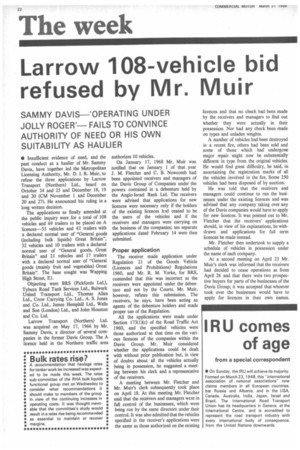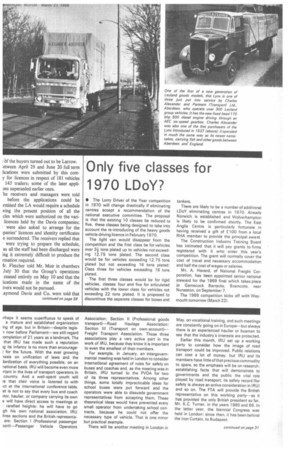I R U comes of age
Page 24

Page 25

If you've noticed an error in this article please click here to report it so we can fix it.
from a special correspondent
• On Sunday, the IR U will achieve its majority. Formed on March 23, 1948, this -international association of national associations" now claims members in all European countries, bar Russia and Albania, and in the USA, Canada, Australia, India, Japan, Israel and Brazil. The International Road Transport Union has its headquarters in Geneva, at the International Centre, and is accredited to represent the road transport industry with every international body of consequence, from the United Nations downwards. Irhaps it seems superfluous to speak of a mature and established organization ing of age. but in Britain—despite legisn now before Parliament—we still regard :ompletion of 21 years as a landmark. The that IRU has made such a reputation ig its infancy is no more than encouragefor the 'future. With the ever growing lasis on unification of laws and the lardization of everything possible, on an national basis, IR U will become even more rtant in the lives of transport operators in country. And a well-spent youth will re that their voice is listened to with !ct at the international conference table. at is not to say that every bus and coach itor, haulier, or company carrying its own s will have direct access to meetings at
rarefied heights: he will have to go gh his own national association. IRU hree sections and the British representaare: Section 1 (Professional passenger aortl—Passenger Vehicle Operators Association; Section II (Professional goods transport)—Road Haulage Association: Section III (Transport on own-account(Freight Transport Association. These three associations play a very active part in the work of IR U, because they know it is important to even the smallest of their members.
For example, in January, an intergovernmental meeting was held in London to consider international agreement of rules for safety on buses and coaches and, as the meeting was in Britain, I RU turned to the PVOA for two of its three representatives. Among other things, some totally impracticable ideas for school buses were put forward and the operators were able to dissuade government representatives from accepting them. These theoretical ideas would have prevented every small operator from undertaking school contracts, because he could not offer the necessary type of vehicle. That is one minor but practical example.
There will be another meeting in London in May, on vocational training, and such meetings are constantly going on in Europe—but always there is an experienced haulier or busman to see that the industry's interests are protected.
Earlier this month. IRU set up a working party to consider how the image of road transport could be improved. Public relations can cost a lot of money, but IRU and its members have little of that precious commodity to spare, so the emphasis will be on research: establishing facts that will demonstrate to governments and the public the vital role played by road transport, its safety record (for safety is always an active consideration in IRU) and so on. The FTA will provide the British representative on this working party—as it has provided the only British president so far, Mr. K.C. Turner, in the years 1965 and 66.1n the latter year, the biennial Congress was held in London: since then, it has been behind the Iron Curtain, to Budapest.
























































































































